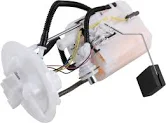The mechanical and the electric fuel pump differ in their operation as well as its use with vehicles. Back in the day, when carbureted engines still existed, most cars came with mechanical fuel pumps that pulled their actuation from engine rotation to move raw gasoline around; nowadays (and yes I know some cars and trucks continue using this old tech), we find gas-powered motors fitted with electric afterburners needed for propulsion.
In mechanical fuel pumps, there is a plunger attached to the camshaft or crankshaft. Theres a lever on the pump that works as you run your engine, so when the engine is running it pulls fuel from tank and sends to carb. The pumps produce very low pressure — usually only 4 to 10 psi (pounds per square inch). The carbureted engines need to have a sufficient toward naturally aspirated LS-series V-8 also produces 200 hp at the same 5,700 rpm. Mechanical pumps have only three to four components in comparison with the more complex design of an electric pump and repairs or replacement costs are much less; usually $100-$200.
In contrast, the Electric fuel pump is used in modern fuel injection systems related to higher pressure needed for Fuel Atomization within an internal combustion engine. The electric pumps are installed either in or near the fuel tank and deliver pressures of 30 to 80 psi based on manufacturer specs. Additionally, electric pumps promise a fuel efficiency of 20% better than carbureted systems can deliver due to the precision it gives as Bosch says in this survey.
An electric fuel pump can ensure that proper pressure is maintained, regardless of the operating conditions (idle or wide open throttle). This is because the pump is controlled by Engine Control Unit (ECU) of car and will change its output according to real time fuel needs. Mechanical pumps, which deliver a constant flow of fuel regardless of engine speed or power demand, can't match the economy and flexibility that computerized management systems provide.
However, the electric pumps can also be more likely to overheat when operated out of fuel if it happens repeatedly. When your vehicle is low on fuel, it means that the pump cannot cool itself effectively which can cause a premature breakdown. Electric pumps cost even more, between $300 and upwards of$1,000 depending on the vehicle. Even though they are more expensive, their reduced wear and increased performance lifespan make them the ideal choice for today's mechanical fuel-injected engines which require very precise control of quality to run at peak efficiency.

The importance of reliable electric systems was demonstrated by a recall from Ford which took place in 2019 affecting over 120,000 vehicles with defective electric fuel pumps. Engine stalls due to unexpected fuel pump failure creates unsafe driving conditions. To avoid such failures, you must perform the occasional checking and maintenance to your fuel pump.
With the emergence of hybrid and electric vehicles, some newer vehicle models are eliminating gasoline fuel pumps in favor of increasing numbers to electric fuel pumps. Modern automotive design similarly uses mechanical pumps less than classic cars, instead relying on electrical fuel pump (or in the case of today's electric car), fed by battery power.
Fuel Pump, car owners can turn to auto parts sites like Fuel Pump for Mechanical and Electrical Fuel Pump replacements as well.